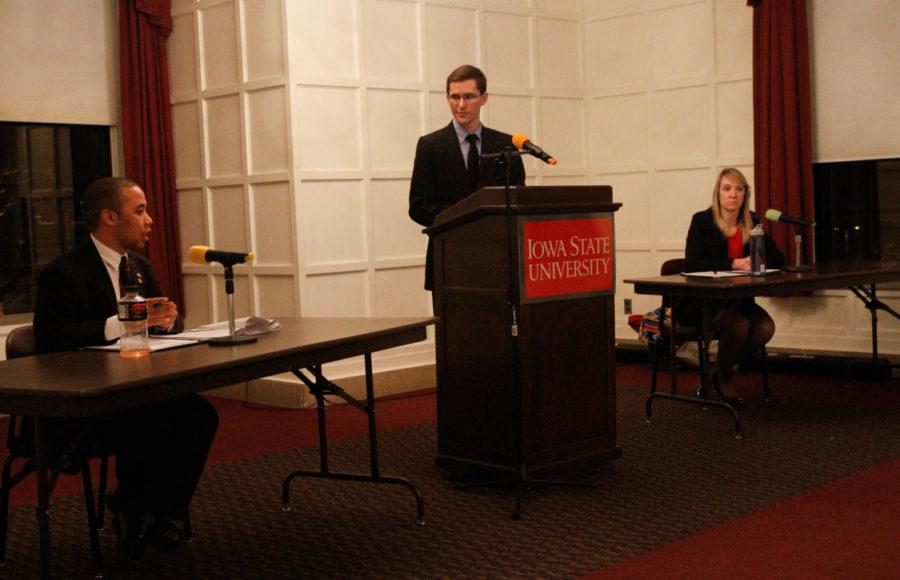Editorial: Unlimited funds unnecessary for election campaigns
Tiffany Herring/Iowa State Daily
Government of the Student Body presidential candidates Khayree Fitten and Hillary Kletscher participate in the presidential debate on Feb. 28 in the Cardinal Room at the Memorial Union.
January 23, 2015
The conversation about campaign funds has finally reached the Government of the Student Body, just like the conversation is already flowing through the veins of the U.S. government.
Each election year, the political jabber of the appropriateness for big-name corporations to back candidates with endless amounts of money so that candidate will support the corporations’ views finds its way into everyday conversation. Verbal fights break out on television stations about the matter and the drama continues year-in and year-out it seems. That same ploy for unlimited campaign funding has now entered the room of the GSB Senate.
Earlier in the fall semester, GSB President Hillary Kletscher vetoed a bill that went through the Senate that would have allowed unlimited campaign spending in GSB elections. On Jan. 14, the GSB Senate attempted to override Kletscher’s veto, but was unsuccessful. The current cap on spending is set at $1,250.
Members of the GSB Senate argued that no matter what the spending limit is, it doesn’t always make a difference. Sen. Richard Hartnett said at the Jan. 14 meeting that students ought to make their own decisions, no matter how much money is put into a campaign.
Kletscher said she didn’t want to see students pouring loan money in to compete with other high campaign spendings, and then consequently ending up with even more debt than some already have.
Is this really the kind of government you want to set up at Iowa State?
If candidates think they need unlimited amounts of money to try and persuade voters with candy and buttons and stickers rather than with their goals, ideals and personal rhetoric, are those the candidates we really want? Students are not as naive as some GSB members may think. A bunch of flashy buttons and some Laffy Taffy won’t mean a thing if you don’t follow through on your platforms in the following year.
If those candidates can’t get their message across to students with $1,250, what is unlimited money really going to do? Move forward from buying votes with candy and hot chocolate to personally bribe a group of students with a monetary fund?
For students, this idea of unlimited spending should come as an insult. Those in favor of unscrewing the cap on campaign spending are asking to wean out the lesser financially stable candidates-ones who might have equal or better values similar to yours-simply because they can’t afford to buy you and your friends food or drinks.
Let’s cut the high school popularity contest and get back to winning students over with the idea of making this university a better place, based upon ideals and goals that have the interest of students in mind, not upon who can buy the most licorice.

















